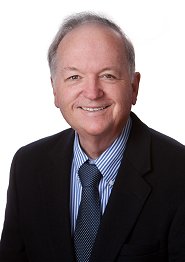|
|
San Jose
State University
Silicon Valley's Paycheck Powerhouse |
|
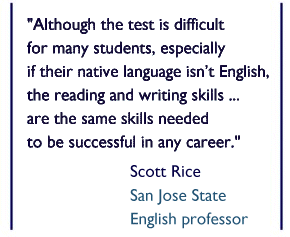 San
Jose State University’s recent graduates are some of the best paid
in the nation, earning $53,500 a year during the first five years
after graduation, according to a survey by payscale.com. And students
from its engineering departments—rated 14th in the nation among
colleges offering bachelor’s and master’s degrees—earn much more. San
Jose State University’s recent graduates are some of the best paid
in the nation, earning $53,500 a year during the first five years
after graduation, according to a survey by payscale.com. And students
from its engineering departments—rated 14th in the nation among
colleges offering bachelor’s and master’s degrees—earn much more.
All San Jose State University students, including those in technical
majors, must pass the Writing Skills Test by their junior year.
San Jose State English professor Scott Rice helped institute this
exam more than 20 years ago in response to requests from Silicon
Valley companies and other employers.
"The most important secrets to passing this English test are
to try hard, read the directions very carefully, and follow them,"
he said. "Although the test is difficult for many students,
especially if their native language isn’t English, the reading
and writing skills needed to graduate from San Jose State are the
same skills needed to be successful in any career."
Many
San Jose students go to work right after earning their degrees,
but some, such as Tin Tran, go on to prestigious graduate schools.
Tran, who studied with Improve Your English for four years while
at Los Gatos High School, will start at Tufts University School
of Dental Medicine next fall.
“Going to SJSU saved me a lot of money and allowed me to spend
a few more years with my family before I move to Boston for dental
school,” Tran says.
“The facilities for the sciences are just as good as at UC
schools, and the lab classes are usually taught by PhDs, not graduate
students.”
Tran’s younger brother, Tan, also attends SJSU. Although admitted
to Berkeley, he chose to stay in San Jose for his undergraduate
education. Like his brother, he plans to enter either dental or
medical school.
SJSU students have the chance to rub shoulders with people from
the world’s most important technology companies. Dennis Schaaf,
a native of Germany who studied with Improve Your English in 2004,
graduated from SJSU with a degree in mechanical engineering. As
a senior, he interned with Tesla Motors, now the Silicon Valley’s
hottest start-up.
SJSU is part of America’s largest university—the 23-campus
California State University system, which reaches 773 miles from
San Diego to Humboldt. The CSU campuses have more than 430,000 students,
with San Jose State contributing 29,000 students to the total. The
university adds billions of dollars to California’s economy
and trains 40% of the state’s engineers.
Next
time: University of California, Berkeley
Newsletter
Table of Contents |
More Newsletters |
Back to
Improve Your English
|
|
|
Accept
vs. Except
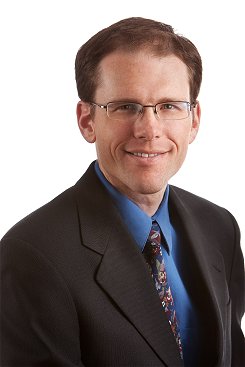
Nat Crawford,
director of tutoring
|
|
|
by
Nat Crawford
Accept
is most commonly used as a verb.
I accepted
the award.
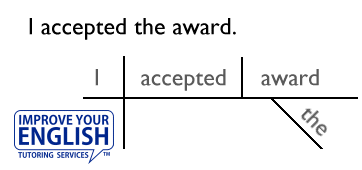
Except
is most commonly used as a preposition, either by itself or
in the phrase except for.
All the drivers
except me skidded on the ice.
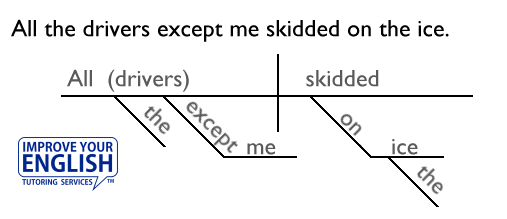
When deciding which
word to use, visualize creating a sentence diagram.
Alternatively,
imagine substituting the word but (the preposition)
for the word accept/except.

It works! Choose
except.

Doesn't work. Choose
accept.
For
answers to specific writing questions, email us here.
Who knows? Your question may inspire our next article on The
Right Word.
Newsletter
Table of Contents |
More Newsletters |
Back to
Improve Your English
|
|
|
|
Strunk and White's
Rule No. 1
|
by
Steve High
Form the
possessive singular of nouns by adding 's regardless
of the final consonant.
To form the
possessive plural of nouns, follow these steps:
- If the noun is singular, follow rule 1.
- If the noun
is plural and ends in s or es,
add an apostrophe at the end of the word.
- If the noun is plural and does not end in
s or es, follow rule
1.
Examples:
This
is the boy's bedroom.
|
(Boy is singular; you have only one son.) |
This
is the boys' bedroom.
|
(Boys is plural; you have two sons who share
a bedroom.) |
| This
is the children's room. |
(Children is a plural not ending in -s;
you have two or more children who use the room.) |
Following these
simple steps will lead you to the correct answer in all but
a very few troublesome cases.
Possessive nouns
are diagrammed in the same way as nouns used as adjectives,
but they do not mean the same thing.
The
Chess Club is a club for chess, not a club possessed by
chess.
Boys Town, Nebraska, is a place for boys, not a town owned
by boys.
Sometimes the
difference between a possessive and a noun used as an adjective
is hard to determine. For example, a search of corporate
information reveals the following astonishing sentence, which
uses boy three different ways:
Father Flanagan's
Boy's Home Inc. is a private company categorized under Boys'
Towns and located in Boys Town, NE.
In other cases,
determining the plural itself is equally difficult.
For example, a farmer troubled with snakes decided to import
a predator to kill the snakes. But he wasn't sure whether
to order two mongooses, two mongeese, or two mongoose. So
he wrote the following letter:
Dear Sirs,
Please send
me a mongoose. On second thought, make it two.
For
answers to specific writing questions, email us here.
Who
knows? Your question may
inspire our next article on Writing
Tips.
Newsletter
Table of Contents |
More Newsletters |
Back to
Improve Your English
|
|
|
|
|
|
James
Joyce
|
by
Nat Crawford
James
Joyce wrote some of the simplest and most elegant prose in
the English language:
The
evening air was pale and chilly, and after every charge
and thud of the footballers, the greasy leather orb flew
like a heavy bird through the grey light.
His first novel, A
Portrait of the Artist as a Young Man, shows the gradual
development of a youth's perspective on the world. The book
begins with the perceptions of a child, Stephen Daedelus, at
boarding school; it depicts Stephen's simple observations (such
as the one above) and naïve questions:
What
was after the universe? Nothing. But was there anything
round the universe to show where it stopped before the nothing
place began?
As Stephen grows
older, he turns to describing the joy of being young, free,
and passionately alive. Here he walks on the seashore, in
the midst of an important decision about whether to become
a priest or an artist:
He
was alone. He was unheeded, happy and near to the wild heart
of life. He was alone and young and wilful and wildhearted,
alone amid a waste of wild air and brackish waters and the
sea-harvest of shells and tangle and veiled grey sunlight
and gayclad lightclad figures of children and girls and
voices childish and girlish in the air.
Religion and art
are two important themes of the book, and Joyce leavens his
discussions of them with humor. At one point, Stephen discusses
religious faith with his friend Cranly:
Cranly,
embarrassed for a moment, took another fig from his pocket
and was about to eat it when Stephen said:
—-Don't, please. You cannot discuss this question with
your mouth full of chewed fig.
In
the last sections of the book, which consist of Stephen's
diary, Stephen offers flashes of thought about beauty, politics,
and the decisions that young people face. At one point he
pokes gentle fun at his own behavior as a young man in love.
Here he describes a conversation with a young woman he admires:
[I]
opened the spiritual-heroic refrigerating apparatus, invented
and patented in all countries by Dante Alighieri. Talked
rapidly of myself and my plans. In the midst of it unluckily
I made a sudden gesture of a revolutionary nature. I must
have looked like a fellow throwing a handful of peas into
the air. People began to look at us.
Like all young
people, Stephen must decide between what others expect of
him and what he himself wants. It is a story of discoveries,
halts, errors, and decisions, and though readers know the
outcome in advance, they keep turning the pages for the beauty,
reflection, and humor that Joyce puts into his tale.
Later, in Ulysses
and Finnegan’s Wake, Joyce turned to writing sentences
that stretch for pages and to words spun from all the languages
of Europe. He also created a few puzzlers, such as this
one:
He
wished that a tale of a deed should be told of a deed not
by him should by him not be told.
Joyce's name is
now synonymous with difficulty, and he gloried in expansive
writing, but his tightly structured poems are also worth reading.
With the simplicity and elegance of his early prose, they
express love and loneliness.
|
|
All
Day I Hear the Noise of Waters
All
day I hear the noise of waters
Making moan,
Sad as the sea-bird is when, going
Forth alone,
He hears the winds cry to the water's
Monotone.
The
grey winds, the cold winds are blowing
Where I go.
I hear the noise of many waters
Far below.
All day, all night, I hear them flowing
To and fro.
|
|
Because
Your Voice Was at My Side
Because
your voice was at my side
I
gave him pain,
Because within my hand I held
Your
hand again.
There
is no word nor any sign
Can
make amend—
He is a stranger to me now
Who
was my friend.
|
Newsletter
Table of Contents |
More Newsletters |
Back to
Improve Your English
|
|
|

 San
Jose State University’s recent graduates are some of the best paid
in the nation, earning $53,500 a year during the first five years
after graduation, according to a survey by payscale.com. And students
from its engineering departments—rated 14th in the nation among
colleges offering bachelor’s and master’s degrees—earn much more.
San
Jose State University’s recent graduates are some of the best paid
in the nation, earning $53,500 a year during the first five years
after graduation, according to a survey by payscale.com. And students
from its engineering departments—rated 14th in the nation among
colleges offering bachelor’s and master’s degrees—earn much more.





